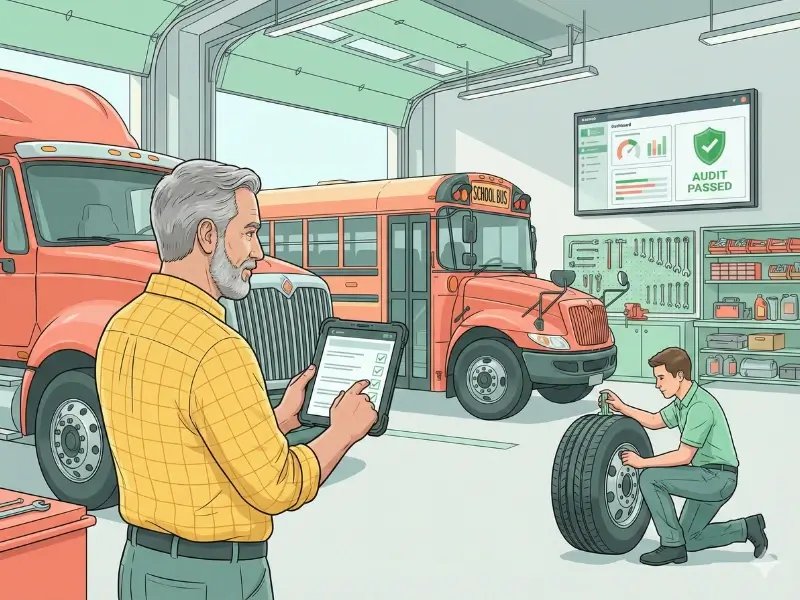Key Takeaways
Brake safety has always been a critical concern in the trucking industry. Despite advancements in brake technology, many of us take our braking systems for granted. With the advent of robust and reliable automatic brake adjusters and air disc brakes, it's easy to assume that brake maintenance is a non-issue. But is it?
Every time the Commercial Vehicle Safety Alliance (CVSA) conducts a surprise or scheduled brake inspection, about 20–25% of trucks have brake violations and are taken out of service. This statistic has remained steady over the years. Is there anything you can do to improve these outcomes?
With Brake Safety Week 2024 approaching on August 22–25, it’s crucial to understand what this event is all about and how you can utilize it to enhance the safety of your trucking fleet.
What is Brake Safety Week?
Brake Safety Week is an annual event that has evolved from a single-day to a week-long initiative since the 1990s. This week, inspectors across North America thoroughly inspect trucks and buses, focusing specifically on brake systems.
This event is not only about enforcement but also about education. CVSA promotes the event in advance and provides valuable resources on its website, including tips for drivers on preventing brake hose chafing and other common brake issues.
How Does CVSA Choose the Focus Area?
The Commercial Vehicle Safety Alliance (CVSA) employs a data-driven approach to select the focal point for its annual Brake Safety Week campaign. This strategic methodology ensures the initiative addresses the most critical brake-related issues facing the commercial trucking industry.
A dedicated committee within CVSA analyzes inspection data collected throughout the year. This data encompasses a broad spectrum of vehicle inspections across North America, providing a comprehensive overview of the most common brake system violations. By identifying trends and patterns in these violations, the committee can pinpoint specific areas of concern that require targeted attention.
Once the data analysis is complete, the committee evaluates the severity and frequency of brake-related violations. Specific issues, such as brake pad and brake rotor wear, may be prevalent but do not pose a safety risk as other problems. Conversely, less frequent but critically dangerous violations, like brake line ruptures, warrant immediate attention.
By carefully considering these factors, the committee ultimately determines the primary focus for Brake Safety Week. This targeted approach allows CVSA to maximize the campaign's impact by directing resources and educational efforts toward the most pressing brake safety concerns.

Common Brake Issues and Their Causes
As we've discussed, CVSA determines the focus of Brake Safety Week based on the most prevalent brake violations identified during inspections. Let's explore the specific brake issues that frequently cause commercial vehicles to be taken out of service.
Brake Pad and Rotor Wear
Brake pads and rotor wear are natural consequences of vehicle operation. However, excessive wear can be caused by harsh braking, poor-quality components, or underlying mechanical issues. Symptoms include squealing or grinding noises and a noticeable increase in stopping distance.
Brake Fluid Contamination
Brake fluid contamination can significantly impair braking performance. Water ingress, air in the system, or leaks in the brake lines can lead to a soft, spongy brake pedal and reduced braking efficiency. This condition requires immediate attention to prevent a failure.
Hydraulic System Failures
The hydraulic system is crucial for transmitting brake pressure to the wheels. Failures in components like the master cylinder, brake calipers, or brake lines can result in complete brake failure or a brake pedal that goes to the floor. Regular inspections and maintenance are essential to prevent such incidents.
Brake Overheating
Excessive heat can cause brake fade, reducing braking effectiveness. Prolonged or heavy braking, downhill driving, or inadequate cooling systems can contribute to brake overheating. Overheated brakes may emit smoke and exhibit a reduced ability to stop the vehicle.
Wheel End Components
Issues with wheel end components can affect brake performance and vehicle handling. Worn or damaged wheel bearings, seized calipers, or misaligned wheels can cause vibration, pulling to one side, and uneven brake wear. Regular inspections and proper alignment are crucial to prevent these problems.
Air System Issues
Air brake systems rely on compressed air for braking. Leaks in airlines, compressor failures, or faulty valves can lead to low brake pressure, inconsistent braking, and potential safety hazards. Regular air system checks and maintenance are essential to ensure optimal performance.
Automatic Brake Adjusters (ABAs)
Automatic brake adjusters maintain proper brake pad clearance. Malfunctioning ABAs, improper adjustment, or sticking brake components can result in uneven brake pad wear and reduced braking efficiency. Regular inspection and adjustment of ABAs are crucial for brake system health.
Download a Free Truck Maintenance Checklist
Why Do Out-of-Service Rates Remain High?
Brake-related vehicle breakdowns continue to affect fleet operations, driving up out-of-service rates. Let’s explore the key factors contributing to this persistent problem.
Lack of Regular Maintenance
One of the primary reasons for persistent brake problems is the neglect of regular maintenance. Brake systems are complex components that require consistent attention.
Overlooking routine inspections, fluid changes, and component replacements can lead to gradual deterioration and catastrophic failures. Under pressure to maximize vehicle uptime and profitability, many fleet operators may prioritize other maintenance tasks over brake maintenance.
Substandard Maintenance
Even when maintenance is performed, its quality can vary significantly. A shortage of skilled technicians and time pressures to quickly get vehicles back on the road can result in substandard artistry.
Improperly adjusted brakes, contaminated brake fluid, or incorrectly installed components can all compromise brake safety. Additionally, the use of low-quality replacement parts can further exacerbate the issue.
Driver Ignorance
Drivers play a critical role in maintaining brake safety. A lack of knowledge about brake system components, warning signs of brake problems, and proper inspection procedures can contribute to the problem.
Drivers unaware of how to conduct thorough pre-trip inspections may miss early indicators of brake issues, allowing problems to worsen.
Furthermore, drivers who are not trained to recognize the importance of brake safety may engage in driving behaviors that accelerate brake wear, such as excessive braking or riding the brakes.
Benefits of Participation for Fleet Operators
Improved Safety
Participating in Brake Safety Week helps fleet owner-operators ensure that their trucks are safe and compliant with regulations, reducing the risk of accidents caused by brake failures. This proactive approach to maintenance can save lives and prevent costly incidents on the road.
Regulatory Compliance
Regular participation in Brake Safety Week and adherence to its guidelines help fleet operators comply with federal and state regulations like Federal Motor Vehicle Safety Standards (FMVSS). This can prevent fines and other penalties associated with brake-related violations.
Operational Efficiency
With participation in Brake Safety Week, you will know how to address brake issues before they lead to out-of-service violations. Fleet operators can maintain smoother operations with fewer disruptions. This also enhances the reputation of the fleet for reliability and safety.
Enhanced Driver Confidence
Participating in Brake Safety Week and ensuring all brake systems are in top condition can boost driver confidence. Knowing that their vehicles are safe to operate, drivers can perform their duties more effectively and with peace of mind, leading to better job satisfaction and retention.
Public Image and Customer Trust
Demonstrating a commitment to safety through participation in Brake Safety Week can enhance the public image of a fleet company. Customers and partners are likelier to trust and do business with companies that prioritize safety and compliance, leading to potential growth in business opportunities.
Access to the Latest Safety Trends and Practices
Participation in Brake Safety Week allows fleet operators to stay updated on the latest safety trends and best practices in the industry. The educational resources and outreach efforts provide valuable information on maintaining and improving brake systems, helping fleets stay ahead in safety standards.
The Role of Drivers and Technicians
Both drivers and technicians play critical roles in ensuring the safety of commercial vehicle brake systems. Their combined efforts are essential in preventing brake failures and maintaining overall vehicle safety.
The Driver's Role
Drivers are the first line of defense in identifying potential brake issues. Their daily interaction with the vehicle puts them in a unique position to notice changes in braking performance or unusual sounds.
Drivers are responsible for conducting thorough pre-trip inspections, which include examining brake components for signs of wear, damage, or leaks. Promptly reporting any identified issues to their carriers allows for timely repairs and prevents problems from escalating.
Continuous driver education and training programs can enhance their ability to recognize potential brake problems and respond appropriately.
The Technician's Role
Technicians are responsible for maintaining and repairing commercial vehicle brake systems. Their expertise is crucial in ensuring that brake components are in optimal condition.
To effectively fulfill this role, technicians require ongoing training and education to stay updated on the latest brake technologies and repair techniques.
Adherence to industry standards and best practices is essential for maintaining high-quality workmanship. Technicians can significantly contribute to brake safety by performing regular brake inspections, identifying and addressing potential issues, and using quality replacement parts.
Related Posts
- The Ultimate Guide to Vehicle Inspection Forms and Inspection App
- Vehicle Inspection Software: Revolutionizing Vehicle Safety and Maintenance
- Safety for Fleets: Ensure the Safety of Your Fleet with Simply Fleet
Conclusion
Improving brake safety is a collective effort that requires the involvement of everyone in the trucking industry. As we approach Brake Safety Week 2024, let’s commit to better training, regular maintenance, and increased awareness. Together, we can ensure our trucks are safe on the roads.
Stay safe, and don’t forget to connect with us on social media and subscribe to our YouTube channel for more insights and updates on trucking safety.



.png)








.png)


.png)



.webp)

.webp)


